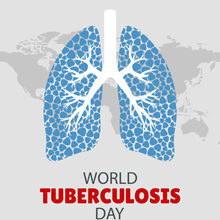World TB Day: TB Policy Briefing Published
22 March 2019

World Tuberculosis Day, commemorated on 24 March each year, helps to raise awareness of tuberculosis (TB) to try to reduce the incidence of TB worldwide. The date marks the day in 1882 when Dr Robert Koch astounded the scientific community by announcing that he had discovered the cause of the disease, the bacterium Mycobacterium tuberculosis.
At the time of Koch’s famous lecture ‘ÜberTuberculose’, TB caused the death of one in every seven people in Europe and America. Koch’s discovery lead to the diagnosis and treatment of TB.
Today, TB remains the world’s deadliest infectious disease. In 2017, 10 million people fell ill, and 1.6 million died from TB (including 0.3 million people with HIV). The emergence and rapid spread of drug-resistant strains of the bacteria has meant that some countries are becoming poorly equipped to respond to infection. TB affects the most vulnerable and threatens livelihoods, perpetuating poverty, undermining economic development and global health security.
Last year global action against TB increased, culminating in the first-ever United Nations (UN) High-Level Meeting on TB in September 2018; which resulted in UN Member States committing to successfully treating 40 million people by 2022. The meeting highlighted the need for immediate action to accelerate progress towards the goal of ending the TB epidemic by 2030, a commitment made by Member States through their endorsement of the World Health Organization’s ‘End TB Strategy’ and the adoption of the UN Sustainable Development Goals (SDGs). Specific targets for 2030 are a 90% reduction in the absolute number of TB deaths and an 80% reduction in TB incidence, compared with levels in 2015. Despite these efforts, a significant global funding shortfall persists and, at the current rate of progress, the SDG targets will not be met for more than 160 years.
For this year’s World TB Day, the Microbiology Society has published a TB Policy Briefing intended to provide an overview of the disease – including its cause, diagnosis, current treatment strategies and obstacles to eradication. The document highlights that ending tuberculosis is possible with better science, improved health systems, substantial investments, and collaboration. Much can be done now to accelerate progress to end TB and policy support is required to:
- Facilitate greater access to modern diagnostics in resource-poor settings to support rapid case identification and help break the transmission of the infection.
- Support basic and applied research to deliver affordable medications, with short treatment durations and fewer side effects.
- Promote national and international collaborative teams, across academia, government and the pharmaceutical industry to support and enhance the full continuum of research and development.
UK-based academics and clinicians with an interest in TB are invited to join UK Academics & Professionals to End TB (UKAPTB), a group working at the forefront of TB research and treatment, in the UK and overseas, across various disciplines. If you are interested, please email UKAPTB at [email protected].
Image: Andrii Kalenskyi/iStock.
